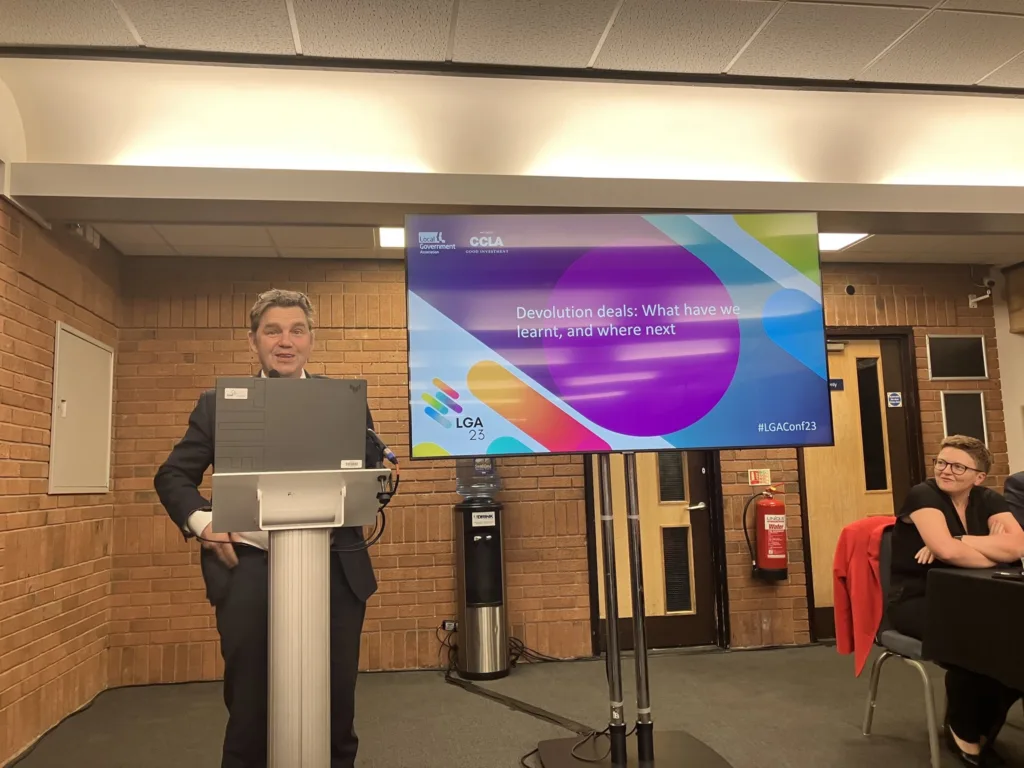Used for the first time this year, a mayoral precept across Cambridgeshire and Peterborough remains in the ‘armoury’ for the Combined Authority to raise funds.
A ‘deep dive’ risk assessment carried out by the Cambridgeshire and Peterborough Combined Authority (CAPCA) reveals a potential cash crisis in coming years after the Government switched to a bid-based approach to funding as opposed to direct allocation.
Instead of continuing to make devolved funding settlements to the Combined Authority, there has been a move toward centrally controlled bid-based funding allocation from Central Government.
Unless these individual bids are successful, there is a risk to CAPCA’s finances which could, says a report to the audit and governance committee next week, mean looking at the three main revenue raising powers it has at its disposal.
These include a mayoral general precept (council tax).
Transport levy also an option
CAPCA can also create a business rates supplement and also set the transport levy on the local highways authorities (the county council and Peterborough City Councils).
The mayoral general precept was used for the first time specifically to address the substantial increase in costs of supporting buses.
The precept gives CAPCA power to raise council tax on every house and the income can be used on a wide variety of costs.
And unlike all other council tax raising bodies, there is no existing referendum limit on the mayoral general precept i.e., there is no requirement to hold a referendum if an increase is proposed.
“As such the precept is an extremely versatile tool, and its use is entirely within the Combined Authority’s control as it can agree, or vote down, any precept proposed within the mayor’s budget,” says the report.
“However, it is an increase in taxation on the area’s residents and as such can rightly be contentious, especially against the backdrop of a cost-of-living crisis.”

This year the mayoral general precept of £1 a month, or £12 annually for a band D property, has been added to council tax bills.
It is the first time that CAPCA has used a mayoral precept and was done specifically to raise £3.6m to support its subsidy of bus services.
The audit committee will also be told that CAPCA can create a business rates supplement, which would increase business rates paid in the area by up to 2p per £1; however, says the report, it’s use is limited to delivering a specific project (or package of projects) which deliver economic growth.
And there must be a business case consulted on “which demonstrates the need and impact of such a supplement”.
Councillors are advised that “as such it is a relatively long process with limited application in reacting to inflationary pressures and rather a tool to be examined in the context of funding large strategic projects”.
CAPCA has a final option and that is to levy a transport precept.
This gives them the power to charge local highways authorities for the costs it incurs in the delivery of its responsibilities around local transport.
Predominantly these are the creation of the Local Transport and Connectivity Plan, the operation and costs of the national concessionary fares scheme, and the subsidisation of the privately operated bus network.
The latter of which, says the report, would be replaced with the operation of a franchised bus network were bus franchising to be implemented.
‘Fundamental unsustainability’
The committee will be told that with the exception of a widespread expansion of the mayoral general precept, other actions would not address the “fundamental unsustainability of the Combined Authority’s funding settlement from Government.
“As this is a critical risk both to this Combined Authority and to others nationally, there is continued lobbying of government within regular discussions with civil servants, in responses to funding consultations, and when responding to information gathering exercises from Government”.
CAPCA is also pursuing the opportunity to agree local retention of all growth in business rates within the Combined Authority area as part of ongoing discussions surrounding a second round of devolution deals following the model of GMCA and WMCA’s trailblazers announced in the spring budget.
This is an arrangement which is in place in the majority of Mayoral Combined Authorities already and would result in the Cambridgeshire and Peterborough area keeping an additional £60m per year which is currently redistributed nationally by Central Government.
“As this funding is redistributed to local authorities nationally, agreeing to the retention of these funds within the Combined Authority area would be fiscally neutral for the Treasury,” says the report.
“A relatively small fraction of this could address the sustainability of the Combined Authority’s funding settlement (as business rates increase with business growth and in-line with inflation), leaving the majority available to unlock the delivery of the area’s wider aspirations covering transport, skills, and economic growth.
“The further benefit of this would be the creation of a virtuous cycle – where investment into these areas leads to growth in the local economy, leading to increased business rate income, and increased investment.”
The report also warns of the need to retain funding streams that keep pace with inflation.
And it adds: “There is a chance of a significant agreement with Government, through a new devolution deal, to fundamentally address some of these issues and mitigate the risk the Combined Authority faces, however the decision as to whether this negotiation is successful lies with Government and so is uncertain until an agreement is reached.”

“Great to highlight the Combined Authority’s vision for the region as a place and we can make the most of current and future devolution to get there,” he said.
The report also add that while CAPCA can’t forecast grant income in future years as it’s not certain, it is expected that short-term, project specific funding will make up significant amounts of this gap.
The report explains that in 2018, following the integration of the area’s LEP into the Combined Authority, the Combined Authority had 3 multi-year capital funds: Transforming Cities Fund (£95m over 5-years for transport), the Affordable Housing grants (£170m over 5 years) and the Local Growth Fund (£147m over 6 years) for business and skills investment.
Each of these provided the Combined Authority with certainty over what funding it would have available to deliver its objectives over several years, and gave the Combined Authority devolved decision-making powers to decide which projects would best deliver its strategic objectives within the broad parameters of the funds.
Decide for ourselves
“This is the underlying principle of devolution: allowing local areas to make decisions for themselves on what the important projects are that will deliver change for their area,” says the report.
It offers as an example the Home Upgrade grant to CAPCA worth up to £158m and the £47.m levelling up funding for Peterborough Station quarters.
“But these funds are secured via a bidding process into Central Government which means there is no ability to plan what level of resourcing will be required, nor what can and can’t be achieved, in the medium term as we can’t know what calls for funding the Government will make and thus what projects may be fundable,” says the report.
The outcome of a bid-based approach to funding means CAPCA has little certain funding beyond the project-based awards currently in place.
The committee will hear this has two impacts.
Firstly, it limits CAPCA’s ability to make plans, and set realistic ambitions, beyond the current project-based funding awards.
Secondly it limits CAPCA’s ability to deliver its “strategically important projects as the lack of devolved funding means only projects which fit specific calls for projects from Central Government will receive funding”.
And with little funding beyond the Combined Authority’s annual £12m gainshare (government funding) secured beyond the next two financial years, the risks are real, says the report.
“The ability to deliver strategic change with £60m of gainshare over 5 years is significantly lower than the £472m the authority had access to with gainshare, transforming cities, local growth fund and the affordable housing grants,” says the report.
However, the report strikes an optimistic note that successful bids should ease the pressure and projects, such as the Local Transport and Connectivity Plan, are expected to demonstrate a ‘strategic fit’ for central government funding.
What’s needed going forward
The committee will be told that to try and address the lack of long-term, locally determined, funding available to the area CAPCA is working with the M10 network (the network of the Mayoral Authorities) to persuade Government to expand the powers and flexibilities of the Combined Authority via a round 2 devolution deal like those seen in Greater Manchester (GMCA) and the West Midlands Combined Authorities (WMCA).
Ideally CAPCA would like a single multiyear award of revenue and capital funds from Government “to replace the patchwork of individual grants which it currently receives” but the report also notes this is outside of their control.
The report adds: “The risk of inflation is ubiquitous to all organisations, however the impact is significantly heightened in the case of the Combined Authority as the majority of our funding is granted by Government with none linked to inflation, so the options for the Combined Authority to raise its own income to meet the ever increasing costs of delivery are very limited.”
The 30-year funding settlement agreed within the devolution deal is inherently unsustainable, says the report, as it is £20m a year (£12m capital and £8m revenue) regardless of inflation.
“This is a significant amount of money, but each year the buying power of that money reduces due to inflation. if inflation stayed low, averaging 2% over those 30 years, the £8m revenue in the first year would be equivalent to £4.45m in year 30, a reduction of 44% – if inflation averages 5% this becomes £1.80m, a reduction of 77%,” says the report.
“This is a national issue being felt by Combined Authorities across the country, however, most have some insulation from this in the form of additional ‘core’ funding through locally retained business rates which increase both with growth in the area, and the business rates multiplier which is pegged to inflation.
“Given the scale of ambition for the Combined Authority locally the option to plan for the long term – i.e., staying small and limiting delivery to hold back funding in the first 10-15 years to top-up inflation impacted budgets 20 years later – was not possible. As such the Combined Authority faces a position of reducing buying power each year with costs (staffing, electricity, bus services, etc) increasing while most of the Authority’s funding does not.
“Without a sustainable funding solution being identified the impact on the Combined Authority will be a decline in its ability to deliver the area’s strategic objectives and services resulting in cuts to both services and additional funding being brought into the area due to the Combined Authority’s bidding and advocacy.”
It says: “If the fundamental unsustainability of core funding is not addressed it will eventually result in the Combined Authority being unable to effectively operate and fulfil its obligations under law and the devolution deal.
“Taking into account that inflation is nearly certain, and the high levels of inflation seen over the last 12-18 months, the likelihood of the risk is certain, and the impact is significant”.



















